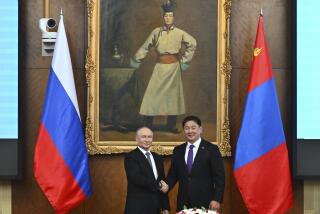With an Eye on China Talks, Russia Rebuffs Dalai Lama
- Share via
MOSCOW — With Prime Minister Mikhail M. Kasyanov in Beijing for talks on a multibillion-dollar oil pipeline, Russia on Tuesday rebuffed a planned visit by the Dalai Lama, saying it could upset relations with China.
Russia is home to about 1 million Buddhists, and their hopes of seeing the Tibetan spiritual leader -- who last visited in the early 1990s -- did not stack up against Moscow’s interest in revived relations with China.
A Foreign Ministry statement described the Tibetan issue as highly sensitive and said Russia did not want to interfere in China’s internal affairs or upset talks between Beijing and the Dalai Lama.
A ministry official suggested that the visit could violate a Russia-China friendship pact signed two years ago, which involved mutual recognition of sovereignty, including China’s possession of Tibet.
“When looking at the question of a visit by the Dalai Lama, we had to take into account all Russia’s interests and strictly follow Russia’s international obligations, including our treaty of friendship with China,” the official said. “China looks negatively on the Dalai Lama’s international activities.”
China, which occupied Tibet in 1951, considers the Dalai Lama a separatist and has criticized countries whose officials meet with him, accusing them of meddling. The Dalai Lama, a Nobel Peace Prize winner, is in the United States, where he met with President Bush.
Last year, Russia’s Foreign Ministry suggested that a visit by the Dalai Lama would be purely religious and therefore possible, but the idea was swiftly quashed, dashing the hopes of Russian Buddhists.
“Ordinary believers cannot understand why they are denied the right to meet their teacher and hear him share his teachings with his flock. There are some elderly people in Kalmykia whose most cherished dream is to see the Dalai Lama and get his blessing before they die,” said Mikhail Burninov, an official from the administration of Kalmykia republic, whose president, Kirsan N. Ilyumzhinov, issued the invitation.
“Now that we see a visit by his holiness disallowed for a second time, the Buddhist community in Russia will clearly feel frustrated and deceived, to put it mildly,” Burninov said.
Speaking by phone from Elista, the Kalmykian capital, he said the Dalai Lama was to consecrate a Buddhist temple and carry out other religious duties, but “clearly big economic and political interests of Russia are at stake.”
Diplomatic ties between Russia and China have warmed in the last decade, but despite increased Russian military exports to China, economic relations have been slower to blossom. Chinese trade with the U.S. is 10 times higher than its trade with Russia.
China’s rapid economic growth and its hunger for Siberian oil underscore the importance to bilateral trade of the planned $2.5-billion oil pipeline. Though the project was endorsed by Russian and Chinese leaders in May, talks reportedly are at a delicate stage.
The countries are in accord on numerous issues, including opposition to the U.S.-led war in Iraq, alarm over a proposed U.S. missile shield, and pressuring North Korea to abandon its nuclear aspirations. China has been one of the few countries to voice strong support for Russia’s campaign to suppress separatists in Chechnya, which has drawn criticism from human rights activists.
The Dalai Lama visited Russia in 1992 and 1994 and several times during the Soviet era, but Tuesday’s decision was the third rebuff to him in two years, which Russian Buddhists saw as evidence that the Kremlin supports the moves to block him. In 2001 Russia refused to provide a transit visa for a trip by the Dalai Lama to Mongolia.
Ilyumzhinov, the Kalmykia leader, invited the exiled religious leader during a recent visit to his base in India. Though he must have known the visit was unlikely to get Moscow’s support, Ilyumzhinov stands to win popularity among Kalmykia’s 150,000 Buddhists, who account for about half the republic’s population. In Moscow, Ilyumzhinov is seen as tarnished by reports of corruption and human rights abuses.
In a phone interview from Elista, Antonina Kookuyeva, president of the Friends of Tibet Society, described the decision as “a spit in our faces.”
“Democracy has become so weak and unimportant in Russia that the authorities feel free to tell the people that the opinion of hundreds of thousands does not make any difference. Ignoring the opinion of the people is immoral, while for Russia as a country the whole situation looks truly humiliating.
“His holiness is in the U.S. now and no one there is scared of letting the Dalai Lama into the country,” Kookuyeva said. “We fail to understand why the Russian side feels so much obliged to be so receptive to the Chinese concerns. It goes to show that Russia is a weak country incapable of pursuing its own assertive policy.”
*
Alexei Kuznetsov of The Times’ Moscow Bureau contributed to this report.
More to Read
Sign up for Essential California
The most important California stories and recommendations in your inbox every morning.
You may occasionally receive promotional content from the Los Angeles Times.










